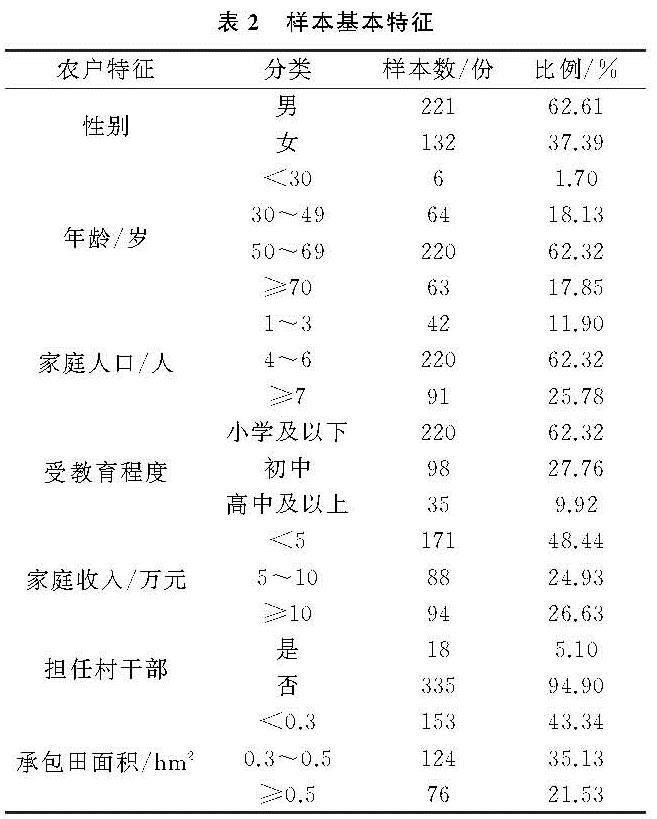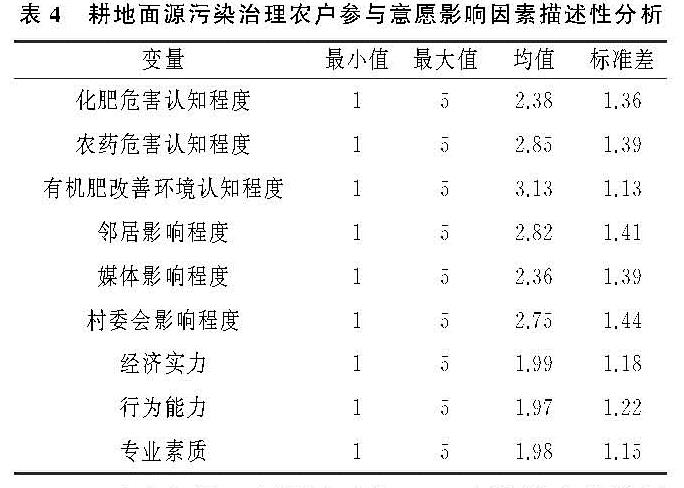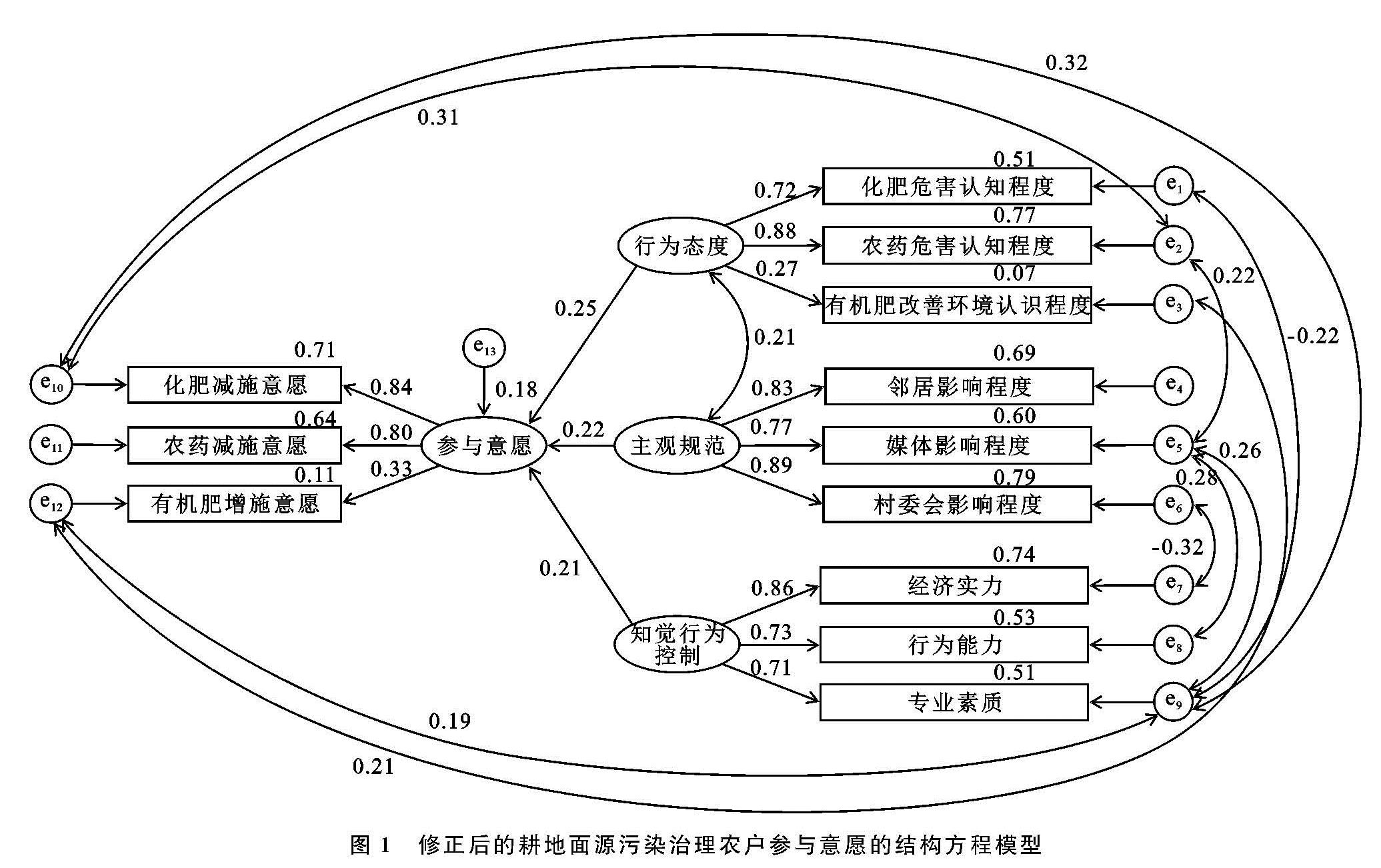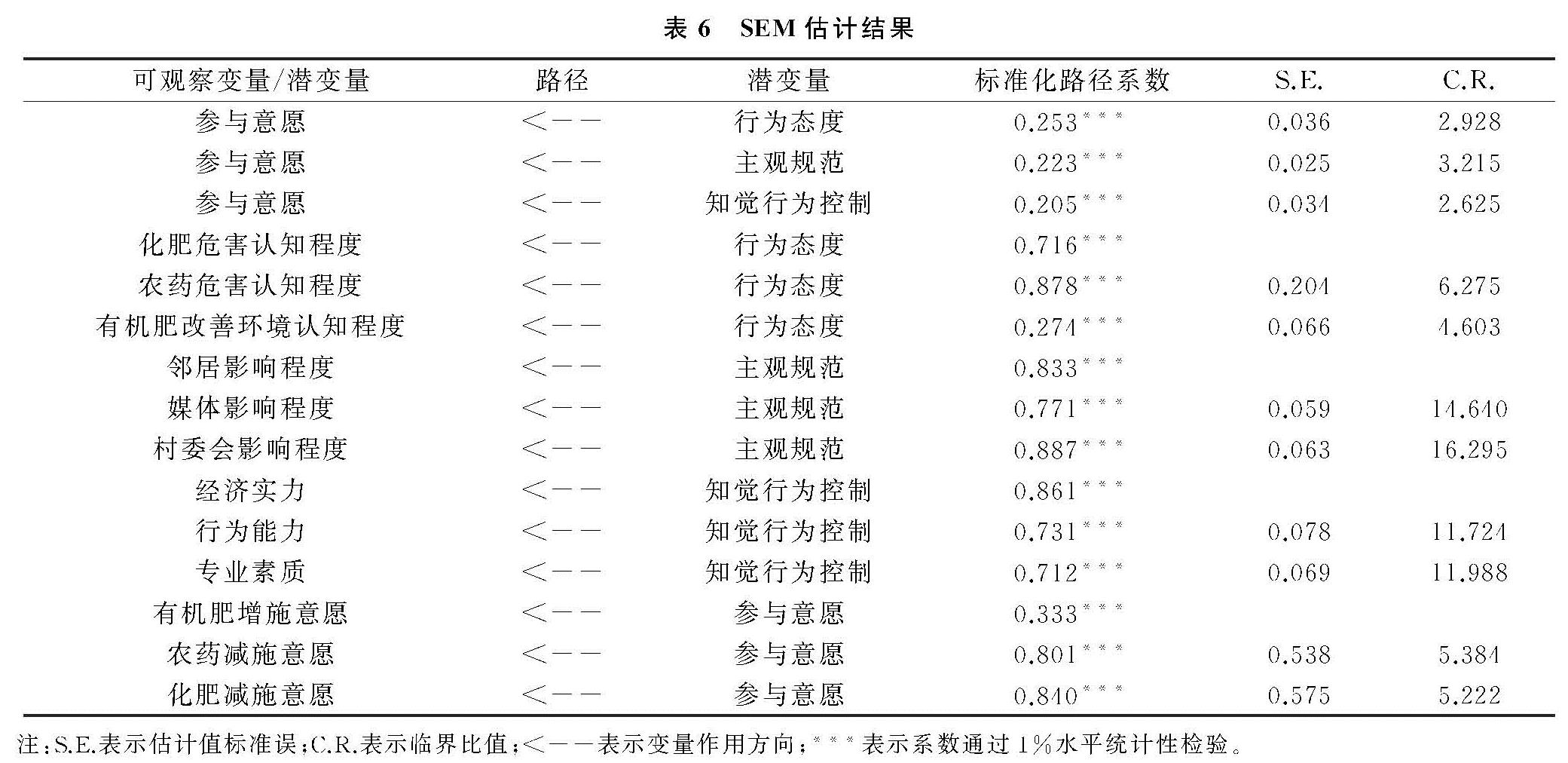4.1 耕地面源污染治理农户参与意愿及其影响因素描述性分析
为了保护耕地质量,维护耕地生态环境,在353户农户中,有247户很不愿意或不太愿意减少施用化肥,占比69.97%; 253户很不愿意或不太愿意减少施用农药,占比71.67%; 只有181户很愿意或较愿意增加有机肥的施用,占比51.27%(表3)。由此可见,调查区域农户参与耕地面源污染治理的积极性不强。
根据理论分析,对影响耕地面源污染农户参与意愿的可能因素进行描述性分析。由表4可知,在农户行为态度方面,农户对化肥危害认知程度较低,仅有32.01%的受访农户认为过量施用化肥对农田、水质和环境有较严重或很严重危害,农户认知程度均值为2.38; 农户对农药危害认知程度也较低,47.31%的受访农户认为过量施用农药对农田、水质和环境有较严重或很严重危害,农户认知程度均值为2.85; 35.13%的受访农户比较认同或非常认同“施用有机肥可以改善耕地生态环境,提高农作物品质”,农户对有机肥改善环境认知程度均值为3.13,说明已有部分农户能够认识到有机肥的好处。在主观规范方面,分别有41.93%,25.50%,38.24%的受访农户表示在进行耕地面源污染治理决策时其会受到邻居、媒体、村委会较大或很大的影响,受邻居、媒体、村委会的影响程度均值分别为2.82,2.36,2.75,说明农户在进行耕地面源污染治理决策时,会受主观规范的一定影响,其中受邻居和村委会的影响程度较高。在知觉行为控制方面,仅分别有15.86%,16.43%,15.86%的受访农户表示有较为足够的经济实力、行为能力、专业素质参与耕地面源污染治理,农户参与耕地面源污染治理的经济实力、行为能力及专业素质均值分别为1.99,1.97,1.98,说明多数农户参与耕地面源污染治理的条件并不充沛,这将极大地限制其参与意愿。
4.2 信度分析与效度分析
4.2.1 信度分析
通常选取Cronbach's α值作为信度检验的标准。利用SPSS 22.0软件对所选12个观察变量进行Cronbach's α检验,12个观察变量总体Cronbach's α值为0.73>0.70,属于高信度。再分别对4个潜变量进行信度检验,其中行为态度3个观察变量Cronbach's α值为0.63,主观规范3个观察变量Cronbach's α值为0.882,知觉行为控制3个观察变量Cronbach's α值为0.82,参与意愿3个观察变量Cronbach's α值为0.671,均大于0.6,因此可以认为样本数据信度较高,一致性较强。
表4 耕地面源污染治理农户参与意愿影响因素描述性分析
4.2.2 效度分析
利用SPSS 22.0对指标变量进行KMO检验及Bartlett球形检验以测量其效度。结果显示,KMO值为0.681>0.5; 显著性p值为0.000,说明样本数据具有较好的结构效度。
4.3 模型拟合检验与修正
极大似然法(ML)是结构方程模型常用的参数估计法,但极大似然法要求样本数据符合多变量正态分布,而在现实中,由于同一地区经济、文化条件和生活习惯的相似性,农户的参与意愿难以满足正态分布的要求。广义最小二乘法(GLS)和加权最小二乘法(WLS)这两种参数估计法,均不受数据的多变量正态分布的限制,其中GLS相比WLS在协方差矩阵分析中表现更加优异,是更稳健的参数估计方法[17]。经过综合比较,本文选择GLS-SEM模型对样本数据进行拟合分析。
通过观察绝对拟合指数、相对拟合指数和简约拟合指数检验模型的拟合情况,发现原始模型指标中Cmin/DF达到3.869,超过3的临界值,因此需要对原始模型进行修正。计算结果发现,部分残差之间的修正指数(MI)较高,因此建立残差之间的联系从而释放估计。此举不违背结构方程模型的基本假设,在理论上和实务上均是合乎逻辑的,达到了修正模型的目的。将修正后的模型再次进行拟合,最终得到拟合检验情况见表5,修正后的结构方程模型见图1。结果表明,虽然规范拟合指数(NFI)为0.848,略小于0.90,但由于该检验量已经接近标准值,处于可以接受的范围内,且其他检验量均达到很好的拟合结果,说明该模型整体拟合程度理想。
4.4 假设检验结果与分析
(1)行为态度对农户参与意愿的影响。由表6可知,农户行为态度对其参与耕地面源污染治理意愿有显著正向影响,标准化路径系数为0.253,说明农户对耕地面源污染治理的态度越积极,其参与意愿越强烈。农户对化肥危害的认知程度和对农药危害的认知程度的因子载荷分别为0.716,0.878,说明农户对化肥、农药过量施用危害耕地生态环境及农作物品质的认同程度对其参与耕地面源污染治理的行为态度有正向影响; 农户对有机肥改善环境的认知程度的因子载荷为0.274,说明农户对有机肥施用改善耕地生态环境和农产品品质的认同程度对其参与耕地面源污染治理的行为态度有正向影响。
(2)主观规范对农户参与意愿的影响。由表6可知,主观规范对农户参与耕地面源污染治理意愿有显著正向影响,标准化路径系数为0.223,说明若农户受到来自集体、社会等外界环境的压力和影响越大,其参与耕地面源污染治理的意愿越强烈。村委会影响程度、邻居影响程度和媒体影响程度的因子载荷分别为0.887,0.833,0.771,说明基层群众自治组织对农户的生产行为影响较大,邻居的示范作用也会影响到农户的生产决策,媒体的影响力度相对较小,但也起到了一定的作用。由此表明,农户参与耕地面源污染治理的意愿不仅受到个人态度的影响,同时也受社会效应影响。
图1 修正后的耕地面源污染治理农户参与意愿的结构方程模型
(3)知觉行为控制对农户参与意愿的影响。由表6可知,农户知觉行为控制对农户参与耕地面源污染治理意愿有显著正向影响,标准化路径系数为0.205,说明若农户具有参与耕地面源污染治理的条件越好,其参与意愿越大。农户经济实力、行为能力和专业素质的因子载荷分别为0.861,0.731,0.712,说明经济因素、行为能力和专业素质都是制约农户参与耕地面源污染治理意愿的重要因素,因此在耕地面源污染治理过程中,政府可适当给予农户一定额度的经济补偿,同时要提升农户参与耕地面源污染治理的专业素质和能力。







